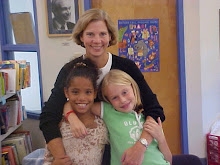In Most Likely to Succeed, Preparing Our Kids for the Innovation Era Harvard education expert Tony Wagner with Tony Dintersmith contend that there are seven essential skills for kids to develop for future success:
1. Formulate good questions
2. Communicate in groups and lead by influence
3. Be agile and adaptable
4. Take initiative and be entrepreneurial
5. Effective written and oral communication skills
6. Know how to access and analyze information
7. Be creative and imaginative
And I might add another. # 8. Do good in the world
These skills are another way of talking about what educators call the Four C's of 21st Century skills: collaboration, creativity, critical thinking, and communication.
I would add: # 5. compassion.
These are great goals to strive for in educating students in and out of the classroom. The trick in school is designing learning activities explicitly around these goals.
Presenting scenarios for humanitarian use of fuel cells (6-7's); preparing for a Show of Work on Hinduism (2-3's); coordinating a hunger awareness event (8th grade); running a "health clinic" for parents and buddies (Pre K 3) - these are examples of activities that build the kind of skills we seek.
The unspoken message is that teachers must possess all of these skills to model and prepare a nuanced and effective program. There is no better way to say it: When Educators Make Space for Play and Passion, Students Develop Purpose.
Tuesday, August 25, 2015
Tuesday, August 18, 2015
Robotics to tree forts - the balancing act
I remember as a child, begging to watch the hour of cartoons available on TV on Saturday mornings before I was told to "Go out and play!" That part lasted the rest of the day.
Finding the balance for our kids today is challenging. How much computer time is OK? How can we make sure our kids are getting time outside for exploring? Both build skills they will need in their futures: intellectual acuity, perseverance, ingenuity, a creative mindset, emotional stamina, flexibility and cooperation.
Teachers struggle with this balance, too. When should we start teaching keyboarding? How young is too young for learning through apps? Here is an interesting article from MindShift about an experiment that shows that pencil and paper note-taking is much more effective for recall and analysis than taking notes on a computer. The brain processes information in many ways, and we want to get it right!
This summer our faculty is reading Catherine Steiner-Adair's book, The Big Disconnect. I've heard her speak and she is compelling in her arguments against screen time for both adults and kids. Our reliance on our phones and iPads - our literal addiction to our devices - prevents us from connecting on an emotional level with those we love most.
Teachers will be discussing The Big Disconnect this fall and we'll hold some discussions with parents, too. I hope you will join in the conversation!
Subscribe to:
Comments (Atom)




